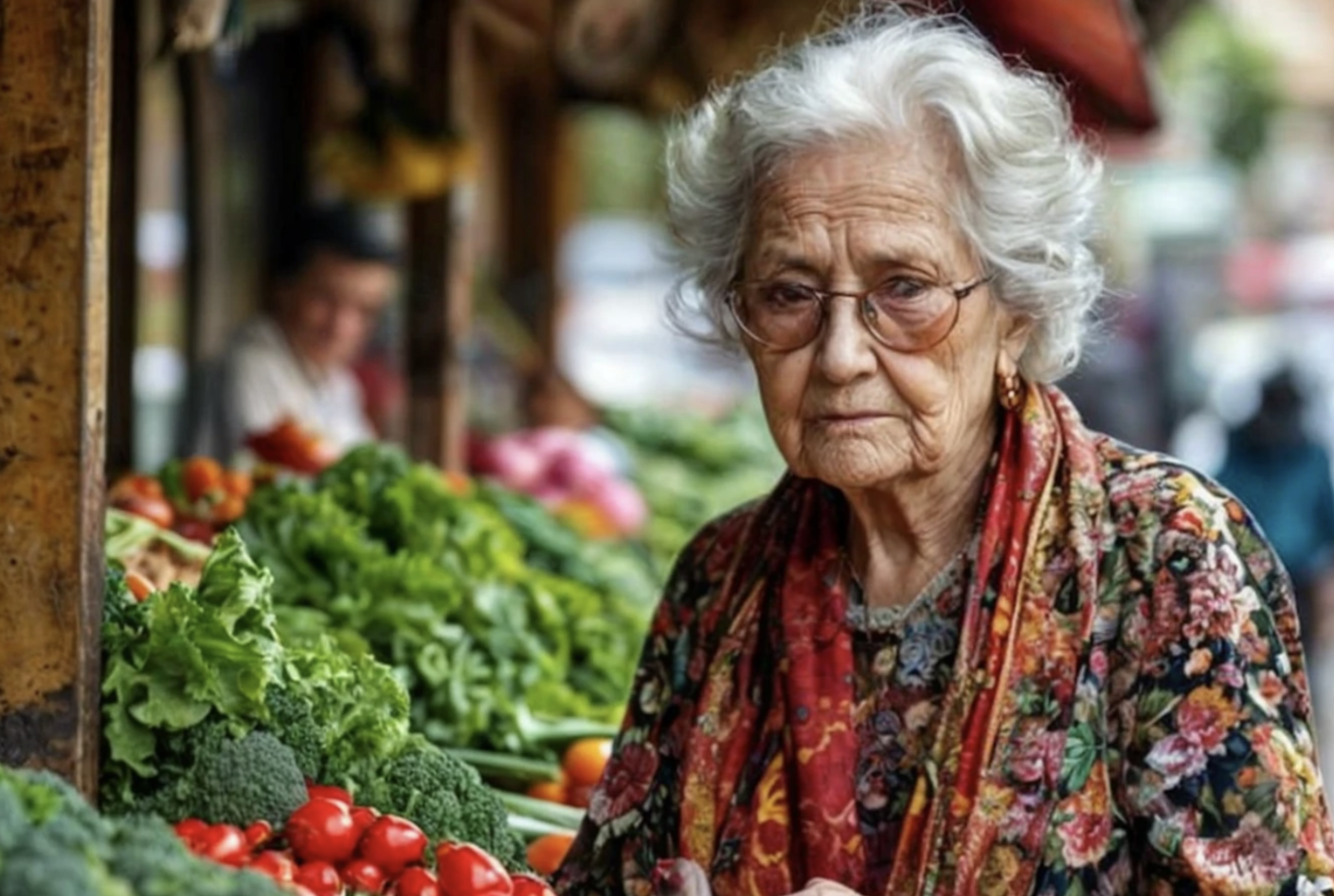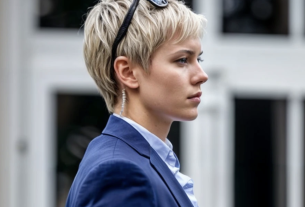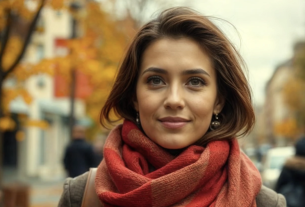Andrey, a young vegetable seller at the market, began each day the same way. As soon as dawn broke, he was already at his spot, neatly arranging boxes of vegetables, fruits, and greens on his small stall. The work was not easy. In the morning, you get up before everyone else, then you lug these heavy boxes, and at the end of the day, you clear everything away. But Andrey was used to it. He found his own special satisfaction in it, even though it was sometimes hard. There is something special in such labor that gives a sense of completion: you see how your work turns into order. Everything is neatly placed, beautiful, each apple like a picture, all the greens as if they were specially for a photo. The customers, although different, brought each day to life in their own way.
Some were in a hurry: grabbing the first bunch of parsley or a couple of cucumbers, throwing money on the counter, and running off without saying a word. There were those who liked to bargain as if their lives depended on it. And, of course, there were people who just came to talk. Sometimes Andrey was surprised at how many people around lacked communication, although the market was always noisy. He was attentive to each one, but among all the customers, he was particularly drawn to one old lady.
She appeared almost every day, early in the morning. Short, slender, in an old, now heavily worn coat, and with an equally old knitted hat, which seemed to have seen better days. In her hands, she always carried a worn fabric bag, well-used. Andrey had gotten used to spotting her from afar. Her kind, but tired face stood out among the bustling customers. She was somehow particularly calm, as if by herself. But it was her eyes, attentive and thoughtful, that caught Andrey’s attention the most. It seemed that she saw something more than just the counters, vegetables, and fruits.
The old lady always stopped at his stall. She approached slowly, as if hesitating, then carefully examined the fruits and greens. Her gaze was such that it seemed she was looking for something special, as if among all this food there was something important, almost magical. But she rarely bought anything. Sometimes it was just one small bunch of dill, sometimes a couple of apples. And always—nothing extra. Andrey noticed that she stood at his stall longer than anyone else. She would look at the fruits for a long time, sometimes even taking out change from her pocket, counting it, and then putting it back. At such moments, her shoulders slightly drooped, and her look became sad. After that, she usually turned and quietly walked away.
Andrey couldn’t help but notice. At first, he just observed, but over time, a strange feeling began to build up inside him. He felt sorry for the old lady, but not because she looked poor. No, it was something else. It was evident how much she wanted to buy something, but something was stopping her. He understood that she didn’t always have enough money even for the simplest things, and this somehow touched him deeply.
One day, when the old lady was standing at his stall again, Andrey decided to speak up.
“What are you looking for, grandma?” he asked, with a light smile, not to frighten her.
The old lady was slightly embarrassed, but did not back away. She looked at him, then at the boxes of fruits, and smiled back. The smile was warm, a bit awkward, but very sincere.
“Just looking,” she replied softly.
Just two words, but Andrey felt that they hid more than she was willing to say. This simple answer somehow stuck in his head. “Just looking”… Somehow, it sounded so sad, as if she had gotten used to being satisfied with just looking.
From that day on, he could no longer just watch her leave with empty hands. Her figure, walking away from the market in her old coat, became a reminder that there are things more important than money or profit. Although Andrey couldn’t change the world, he knew for sure: he could do something for this one old lady.
The next day, Andrey was ready. He noticed the old lady from afar: the same old hat, worn coat, and slow, somewhat uncertain walk. She walked to his stall as if every step was a weighted decision, as if she was thinking again: to approach or not. But Andrey knew she would come. And so, he had already prepared a small package for her. It contained the simplest things: a few potatoes, a bunch of dill, and a couple of apples. Nothing special, but, as he felt, important to her.
When the old lady approached, he immediately handed her the package with a light, almost carefree smile.
“This is for you, grandma,” he said, as if it were the most ordinary thing in the world.
She stopped. First, she just looked at the package, then at Andrey. Surprise mixed with slight embarrassment was readable in her eyes.
“Oh, what are you, I don’t need it,” she hurried, waving her hands.
Her voice was soft but firm, as if she was used to refusing help. It was clear that she was uncomfortable, that she was not used to accepting such gifts, even small ones. But Andrey was not going to give up.
“Grandma, come on, take it,” he said, still smiling. “We have a special on good deeds right now.”
The old lady paused for a moment, then quietly laughed. Her laugh was not loud, but so genuine, as if she had forgotten what it was to laugh. Andrey felt her resistance begin to melt.
“Why, why is this necessary…” she began again, but her voice was not as confident.
Andrey took a step closer and, almost jokingly, placed the package in her hands.
“Don’t worry about it, grandma. Just don’t refuse, or I’ll be offended,” he said with light irony.
The old lady hesitated a bit, but eventually accepted the gift. Her fingers carefully clenched the package, and she pressed it to herself, as if it were some precious gift. For a moment, her face changed. Her lips trembled, and tears appeared in her eyes. Andrey immediately noticed, but said nothing. She quickly took out a handkerchief from her pocket and wiped her eyes, as if afraid someone would see her at that moment.
“Thank you…” she said quietly, almost in a whisper.
Andrey just nodded.
“Come by, grandma. There will be more specials,” he winked.
She smiled again, nodded gratefully, and, pressing the package to her chest, slowly walked away. Her frail figure dissolved in the crowd, but Andrey watched her for a long time. Inside, he had a strange, but warm feeling. It was not pride or joy, but rather a quiet, calm satisfaction. As if he had done something right.
Since then, Andrey started doing this almost every day. When the old lady approached his stall, he already had something small ready for her. A couple of potatoes, some carrots, a couple of apples, or a bunch of greens. All this did not cost much money. Andrey knew he wouldn’t go broke if he gave away a little from his stock, but he saw how much it meant to her.
The old lady still refused at first. Every time, she said she needed nothing, that she didn’t want to be a burden. But Andrey always found a way to convince her. Sometimes he joked, sometimes he just placed the package on the counter and said, “Here, take it, or it’ll spoil.” Gradually, she got used to it.
He noticed how her face changed when she accepted the gift. At first, there was embarrassment, then light surprise, and then—genuine, almost childlike joy. Sometimes she even tried to leave something in return. Once, she brought a couple of boiled eggs, wrapped in a napkin, and said, “I made these myself, for you.” Andrey initially wanted to refuse, but then realized that by doing so, he would only offend her. He took the eggs, smiled, and said:
“Thank you, grandma. This is the best exchange I’ve ever made.”
The old lady laughed. Again, that quiet, but so genuine laugh that Andrey was starting to recognize.
Over time, their interaction became warmer. The old lady no longer just took a small package of vegetables or fruits from Andrey, but also stayed at his stall to talk. He began to notice how she smiled when she approached him, how her eyes brightened slightly. She introduced herself: Valentina Petrovna. A simple, kind name, just like her.
One cold autumn day, when the wind occasionally flipped up coat collars and drove random leaves across the market, she spoke to him. She told him that she lived alone. Her house stood on the very outskirts of the city, old, almost crumbling, but still strong in its foundation.
“I never had children,” she said once, standing at the stall and carefully adjusting the edge of her worn bag. “And my husband died many years ago. So now I’m alone.”
Her words sounded mundane, but Andrey felt how much sadness was in these simple phrases. Her face, with its soft wrinkles and quiet kindness, looked somewhere beyond. Not at the stall, not at the fruits, but somewhere far away, as if beyond all this hustle and bustle.
Now her days passed in solitude. She admitted this without embarrassment, but also without complaints. Trips to the market had become almost the only reason for her to leave the house, to see people, to feel part of this life that continued without her.
“Why do you come here every day?” Andrey once asked.
He was genuinely interested in why she came so often. After all, sometimes she left even without any purchases.
She smiled slightly, but the smile was sad.
“What else is there to do at home?” she answered simply. “There’s just silence and walls.”
Those words somehow touched Andrey. He felt something in her voice that was indisputable. Silence and walls. How hard it must be to live when only this surrounds you.
Sometimes she told him about her youth. She did it lightly, with a smile, and her voice changed during those moments. Life, warmth appeared in it. Andrey loved to listen to her. It seemed that her stories filled the air around with something bright.
She talked about how she and her husband once also grew vegetables, greens, berries. They had their own small garden. They would go together to sell the harvest at the market.
“Oh, how it was back then!” she recalled, her eyes brightening slightly, her lips smiling. “In the summer, we got up at five in the morning, while the sun hadn’t risen yet, picked tomatoes, cucumbers. Everything was our own in the village. And potatoes, and carrots, even grapes.”
Her voice grew a bit louder, gaining an intonation that seemed to have been missing before. Andrey noticed how she came to life, talking about those days.
“We loaded all this into a cart, then onto a bus. Came to the market, just like now. Only there were more people back then. Everyone so cheerful, talkative. Back then, life was really bustling.”
She spoke of this with such warmth that even Andrey felt himself a part of her memories. For a moment, he seemed to see it: the early morning, dew on tomato leaves, the heavy cart they pushed down the road. He imagined Valentina Petrovna young, full of energy, happy. And a home full of sounds, laughter, life.
“We always had everything of our own,” she continued, seemingly unaware that she was speaking for a long time. “I couldn’t even imagine then that I would end up alone. But that’s how it happened.”
Her voice again became quieter. Andrey noticed how she slightly averted her gaze, as if for a moment returning to her reality, where there was no longer a husband or that garden.
“Perhaps you’re not interested in all this,” she suddenly said, as if waking up.
“What are you talking about, grandma, of course, it’s interesting,” Andrey sincerely replied.
He genuinely enjoyed listening to her. Not because her stories were particularly unusual or thrilling. But because there was something real, alive in her words. These were the memories of a person who knew how to appreciate simple things.
One day, Andrey noticed that Valentina Petrovna stopped coming to the market. At first, he didn’t think much of it: maybe she was sick, or just didn’t want to go out in bad weather. It happens. But days passed, and she still didn’t appear. Andrey began to worry. Deep down, a concern was brewing. It was quiet, barely noticeable, but with each day, it increasingly pushed out the usual routine.
He remembered her old coat, her warm knitted hat, that same bag she always carried. Remembered how she smiled, standing at his stall. Her eyes, tired but bright, kind. And from these memories, it became uneasy. Andrey realized: he didn’t know where she lived, didn’t know who to talk to. They had never discussed it. There were no addresses, no phones, nothing.
A week passed. Then another. Valentina Petrovna still did not appear. Andrey tried to convince himself that everything was normal. Probably, she was just busy or decided not to leave the house temporarily. But somewhere inside, everything tightened from a strange, dull feeling.
A couple of weeks later, a middle-aged woman came to the market. She approached Andrey, standing behind his stall, and spoke:
“Are you Andrey?”
He looked at her, slightly surprised.
“Yes, what’s the matter?”
“I’m Valentina Petrovna’s neighbor. She told me about you.”
Inside, something clenched. The woman’s words seemed ordinary, but her voice was heavy, with a slight hoarseness.
“Unfortunately, she died two weeks ago,” she quietly added.
These words hit Andrey like a knife. He froze, not immediately understanding what had happened. His eyes widened, and inside, everything tightened into one point. “How so? Died?!” Images flashed through his mind: Valentina Petrovna with her kind smile, her stories about the past, about how she and her husband grew a garden. All this suddenly became something distant and now unattainable.
“She… died?” he asked again, not believing what he had heard.
The woman nodded.
“She asked me to tell you that she is very grateful to you for everything you did for her,” the neighbor added.
These words only added to the heaviness that now lay on Andrey’s soul. He would no longer see her at his stall. Never hear her quiet voice, never catch her grateful look. She was gone.
A few days later, Andrey received a letter from a notary’s office. He was surprised when he saw the envelope. Not understanding what it could be, he opened it. The letter stated that Valentina Petrovna had left him an inheritance—her small house on the outskirts of the city.
It seemed unreal. Andrey even read the letter several times, thinking that perhaps the addressee was mistaken. But everything was correct. The house now belonged to him.
The next day, he gathered himself and went there to see everything with his own eyes. The journey did not take much time, but during these minutes, Andrey had time to go through all the memories of Valentina Petrovna.
The house was old, as she had said. Peeling paint on the walls, a leaning wooden fence. But something about it immediately seemed close to Andrey. He stood at the gate, looking around, then cautiously pushed them open. The creak of the hinge, thick and lingering, seemed to welcome him.
Inside, the house turned out to be cozy. Despite the exterior, everything inside was clean and neat. Many little things immediately reminded him of the hostess. Knitted doilies lying on tables and windowsills. Walls decorated with old photographs. Wooden shelves on which jars of jam and pickles stood. The smell. Warm, homely. It seemed that somewhere very close still lingered the scent of fresh bread or pies, which she, perhaps, once baked.
Andrey slowly looked around each room. Everything here was hers. Her life, her habits, her memories. He felt his throat tighten from the emotions welling up.
In the corner of one room stood an old chest. Andrey approached it and carefully opened the lid. Inside were a few items: a knitted scarf, a couple of books, an old photo album. And a note.
He unfolded it, and on the paper, in neat, slightly trembling handwriting, was written:
“Dear Andrey, thank you for your kindness. You reminded me that there are still good people in this world. This house is now yours. May it be as warm as it was when you delighted me with your gifts. Valentina Petrovna.”
He read the note several times. Her words resonated deeply inside. Andrey felt a tear roll down his cheek. He didn’t wipe it away. Just sat on the floor, holding this simple, but so important note in his hands.
This house became for him something more than just an inheritance. It was her last gift. A gift full of the warmth she carried within herself, and the memories she wanted to share.



